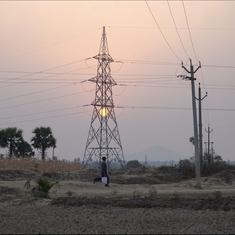On Saturday, Shelley Das stood outside the High Court of Karnataka with a placard that read: Reclaim The Streets. Police officers outside the court had tried to disperse Das and the others with her several times, but the citizens of Bangalore stood their ground.
“We are a democracy, the government has to listen to us and protect us.” Das said. “Just like demonetisation has disrupted the entire economy, we need to disrupt the system – that is the only choice now.”
Das and hundreds of protestors had gathered at venues across Bangalore on Saturday, to register their anger at the incidents of groping and harassment that occurred on New Year’s eve and in the days that followed. Despite a vivid news report about several women on the city’s central MG Road on December 31, the police insisted they have no evidence of mass molestation. They did, however, arrest five men for molesting a woman in another part of the city, after that incident was captured on CCTV. The seeming inaction of the authorities was accompanied by statement from a political leader claiming that the women had invited the attacks by being out on the streets and dressing in western wear.
As the hashtag #BangaloreShamed flooded Twitter timelines, some people began to suggest that the attacks were the result of the large number of migrants to the city, who had made neighbourhoods more anonymous and undermined the sense of security of older residents.

For the women protestors at Cubbon Park, Vidhana Soudha, Brigade Road and Mahatma Gandhi Road on Saturday, the molestations went beyond the petty divisions of Kannadiga vs non-Kannadiga. A single message echoed across the protests: Bangalore’s women are undeterred, strong and here to stay.
Anita Ramesh, who organised of the Touch Me Not human chain near Vidhana Soudha, said she chose the venue because of the high security in the area. Vidhaan Soudha, the seat of Karnataka’s Legislative Assembly, is emblazoned with the words: Government’s Work is God’s Work.
“No one will touch us here,” Ramesh said.

Ramesh noted that women were not safe anywhere in the country – Bengaluru should not be singled out.
“It is not the city alone, but, the society, legislature and law enforcement institutions which has collectively failed the women of India,” she said. “Section 144 has been imposed in several parts of Bangalore, but we are still here for a silent protest.”
At other venues, women claimed that casual misogyny and sexual violence had always been part of the city. It was Bangalore’s attitude of “swalpa adjust madi”, or please adjust, which was frequently used to justify this kind of behaviour and needed to change.

Chartered accountant Shilpaanjali Mula said she had faced instances of molestation in the city for as far back as she could remember.
“When I was studying in middle school, I remember walking past a few government school boys on the way home,” Mula said. “The school kids, who were younger than me, said ‘Why isn’t her skirt shorter?’ I remember being afraid to narrate this incident to mother because I knew that something wrong had happened. I could not risk my freedom at the cost of others. I wouldn’t be allowed to step outside by myself, if my parents knew about the cat calls and eve-teasing which we were always subjected to.”
Several protestors shared stories of their own experiences with sexual violence, challenging the idea of Bangalore as a safe haven for women and progressive thought.

Sharadha, a 52-year-old home-maker and mother of two, said she was constantly worried about her young daughter’s safety in the city.
“Since the early days, I remember men used to touch us, grope, and pinch us whenever we were out in the public, in City Market, Chickpet or any crowded shopping area, we were always under the male gaze,” she said. “For this to change, the change needs to come from us, we need to teach our sons the right thing. This is the only solution.”
Across the city, citizens expressed solidarity with the victims of sexual harassment, driving home the message that women no longer had to suffer silently. Drishti Modi, an advocate, said the government needed to provide better street-lighting and police patrols in every area.
“Women need to feel safe and the onus is on every citizen,” she said. “The police needs to be more sensitive, the government needs to stop politicising events and bystanders need to start becoming more vigilant.”
In other parts of the city, women prepared themselves for battle. Two sessions, on legal rights and self-defence techniques, were organised by citizens free of cost. The legal session, called Know Your Rights, was conducted by lawyers from Alternative Law Forum and Vimochana, under the banner of #IWillGoOut.
A young woman who chose to remain unidentified, organised the self-defence classes called Night In My Shining Armour. The classes were attended by around 70 women, who chanted the words “We are ready to get a beating, in order to give a beating” through the session.
Instructors gave young women techniques to fend off stalkers and molestors at bus stop, parks, roads and in public transport.
Corrections and clarifications: An earlier version of this article mistakenly described the legal rights campaign in Bangalore under the banner #IWillGoLive. This has been corrected to reflect the actual name of the campaign: #IWillGoOut










